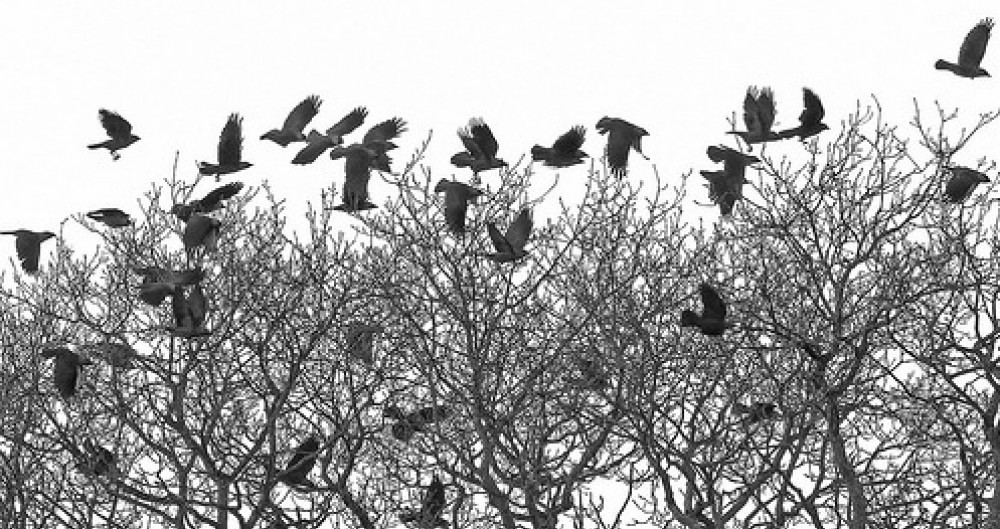Here in the Northwest of England it’s not often we have much of a summer to talk about. But at the moment we are in the middle of a prolonged dry spell, in the middle of a heatwave, nonetheless.
The other night I sat in the back garden listening to Son House, thankful for the cooler air that evening brings. The moon was a striking red colour, possibly portentous but more likely, I thought, due to some strange meteorological condition I’d been too lazy to learn about.
The following morning I stepped through the front door and was immediately aware of a strange smell in the air. My children screwed up their faces dramatically, asking what it was, and then on the school run we noticed in the distance smoke billowing into the bright blue sky from the cradling hills.
The moors were alight. Saddleworth moors, lonely, expansive and untamed, were besieged by crackling swathes of fire. Though we were some miles away it was the scent of the tinder-box peat burning that was reaching us on the westerly breeze.
We have no forests as such around here, at least not to the extent we sometimes see on the news when America suffers those great forest fires. But we do have moorland-possibly the last real wilderness of England, to me northern, bleak and inspirational. The sight of this destruction, on the edge of greater Manchester, was both a novelty and distressing.
Long time followers of City Jackdaw may recall a post from 2013 when my family visited Dovestone Reservoir. That day the scenery was photogenic:

The village of Carrbrook, in Stalybridge, had to be evacuated for the first time in living memory, as the inexorable cocktail of smoke and fumes inched closer, despite the best efforts of firemen to halt it. Peat and heather are slow-burning, difficult to anticipate with the ever-changing winds. Fire in one spot, seemingly vanquished, can burst into flame once again from sparks smouldering beneath the peat. Ash snowed down upon surrounding towns.
People are safe but the effects will be devastating on the wildlife of the area. Already there are tales of deer going into the smoke for their young and coming back out in flames, ground-nesting birds swirling through the smoke crying for chicks that don’t respond, hares lying strewn across the fields while the domesticated animals such as sheep and cattle have been shepherded away to safety, with people offering stables and sheds to locals displaced with horses and chickens. It’s that border between the rural and urban that’s been breached, both joined together in a desolate, charred landscape.
Within the last few minutes I’ve heard that the army has been called in to help stem the tide, and, while on the one hand being angry at the (unsubstantiated reports) that the fire was caused by illegal, off-road bikers, I can only be filled with admiration at the Herculean response of the emergency authorities, battling away in such difficult conditions.

Yet still, in this flaming June, as man does his best to beat back the fire’s advance, we can but pray for rain. Normally the one thing we northerners can count on.



Its devestating. I hope its brought under control very soon. 😦
LikeLiked by 2 people
I’ve just heard about another one breaking out at nearby Winter Hill. We need rain fast.
LikeLiked by 1 person
Yes saw that on the news too. 😦 x
LikeLiked by 1 person
Oh, Andy, a powerful piece! Her in lovely Vermont we are bracing for a heat wave, just the latest in what seems an endless list of climate change events. Between Nature and our viscous government seems like we are truly facing the unimaginable. Anyway, may the rains come to you soon.
LikeLiked by 2 people
Yes there are many challenges lately (aren’t there always?). There is no forecast of rain for at least a week yet, and another fire has broken out at Winter Hill which isn’t too far from where I live.
LikeLiked by 1 person
Stay safe.
As a veteran of Rocky Mountain fires, I know that even if you’re some distance from the actual blazes, the smoke affects a wider area range – and can affect air quality considerably.
It is a curiosity for me to think in terms of the ***smell*** of a wildfire being peat-based rather than timber, brush, leaf-litter based.
LikeLiked by 1 person
I’ve read ‘peat smoke has a pungent peat-reek’ which isn’t really helpful to you!
It smoulders slowly beneath the ground, though, which adds to the difficulty of extinguishing the fire.
LikeLiked by 1 person
Wow, how devastating. Stay safe! Fires are my greatest fear. What a difference between the vacation photo, and the disaster photo!
LikeLiked by 2 people
I know. The contrast conveys the seriousness of the situation, how a landscape can be totally transformed despite our best efforts to help.
LikeLiked by 2 people
Oh, no. Sweden had a big forrest fire couple years ago and the nature damage was enormous. I’m so sorry for you. I hope you are safe. The bright side of fires (if there are any bright sides…) is that nature will come back eventually, but it will take time. Some species need big fires, so you will hear reports about new findings when nature starts to grow back again.
LikeLiked by 1 person
Yes as the saying goes-nature abhors a vacuum. The worry is that bird/butterfly/bee numbers were already down before this. Hope they can recover.
LikeLiked by 1 person
I hope so too. They’re the beginning of all life.
LikeLiked by 1 person
How sad and scary! I can’t help thinking of the fires that happen in the western states here. 😦
LikeLiked by 1 person
Yes we often see your fires on our news-it’s quite rare for around where I live.
LikeLike